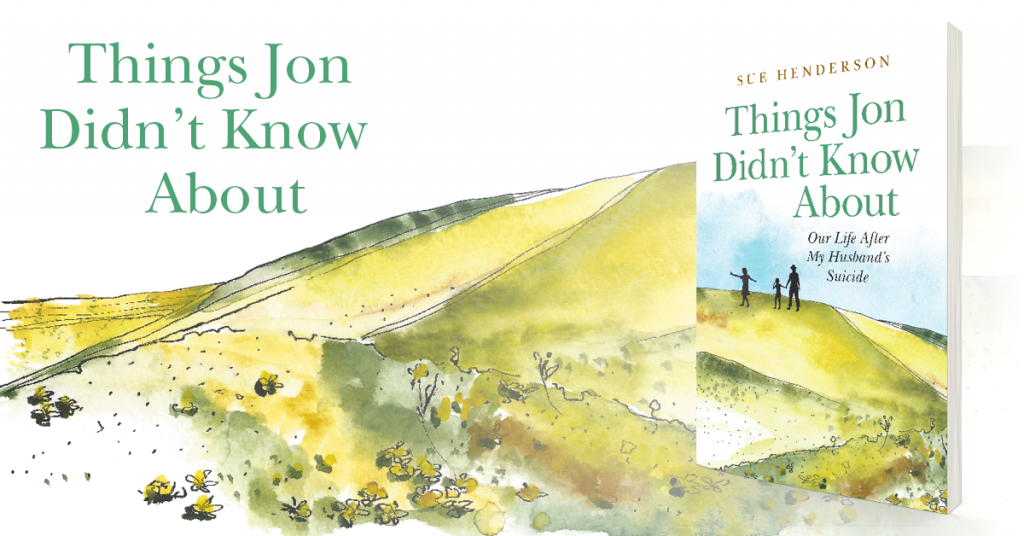
Things Jon Didn’t Know About: Our Life After My Husband’s Suicide is an honest and moving account of the day-to-day practicalities of raising a family as a single parent survivor of suicide with advice on how to talk to children about death and how to support them as they grow up. Author Sue Henderson draws on her experience as a social worker to discusses theories of grief and men’s mental health. Here are her ‘top tips for keeping it together’, taken from chapter 2, ‘A Crash Course in Widowed Single Parenting’:
Set achievable goals and plans. Do this early on (weeks, months, first few years; everyone’s early on is different). You’ll feel good when you manage to get there, and it’ll keep you distracted. Later, try going with the flow a bit more – the need to keep busy is less, because the grief will hopefully be less. Be kind to yourself whichever path you take.
You don’t have to be perfect. Not anywhere near it. Don’t beat yourself up if you don’t do everything that’s on your to-do list. If you are a parent, nothing, literally, is more important than spending the best times possible with your children. Cleaning their shoes, preparing complicated home-cooked meals every day, being on the nursery committee – none of them really matter.
Spend time with your children, individually. This will mean asking someone else for help. It’s OK to do that. Eilidh loved it when we very occasionally managed to have some time by ourselves without Cameron. He was always much sunnier and happygo-lucky, and just loved his big sister. He really did.
Deal with troublesome toddler behaviour. If you can find a trusted friend or family person (preferably without their own children) to help out and share the load, great. Pre-empt the challenging behaviours you know might be possible – distract with anything more exciting: games, a walk to the park, TV time, food. Have options at your fingertips before you reach a crisis point.
Get organised. In fact be super-organised with everything, but only if it doesn’t stress you out. As much as possible, plan ahead so you don’t get panicked by unexpected things. For example, if you have a full body-painting session before bath time, how will you get two paint-covered children from the kitchen downstairs through the house and upstairs to the bathroom without Jackson Pollocking every inch of floor and wall on the way? Apply the same principles to making car or plane travel or supermarket shopping trips fun or at least bearable. As there’s not another adult person there, you have to be able to stop the toddlers getting fractious on a long journey (because it will make you stressed, too, and remind you that you’re doing it alone). So have story and song tapes, or a lengthy repertoire of songs to sing at your fingertips in the car, have travel-sized games, toys and drawing materials on a plane, along with over-generous amounts of snacks. Use the early plane-boarding service for small children. Practise collapsing and folding buggies single-handed (i.e. with one hand, not just by yourself). Let the children pull their own suitcase as soon as they’re big enough. And when you come home from an away trip, have a plan for keeping the children occupied immediately – make sure they have food and entertainment. (I see a theme developing here.)
Ask friends or family for help if you can. They will want to help; they may just not be sure what to do for the best. Tell them. If you need some time to yourself to go for a coffee or a bottle of wine with friends, or to do some exercise, or to garden with sharp implements (not safe with small children about), or to do your favourite thing that reminds you of the old you, that’s what you need to ask them to help with. And tell them when you are feeling bad. They won’t think less of you for it.
Ignore the midnight voices. If you wake in the middle of the night with your head full of stuff, listen to the radio, read a book, write a new to-do list – anything except listening to your head. Lack of sleep will bring you down hard.
Keep things simple for the children. There are bound to be times which by necessity will be hectic and add some craziness. Birthdays, for example, with heaps of presents (people tend to be very generous to children who have lost a parent), lots of extra friends and family around and excesses of sugar, can create monsters out of even the most easy-going children. A few days of simple, calm and spend-no-money time (what I used to call mooching and pootling time) – playing on the beach, going to the park, having a picnic, doing jigsaws, painting – can work wonders for everyone’s over-stimulated spirits.
Take stock. If you feel, after some time, that you should be feeling a bit better but you’re not, take a step back and think whether that’s a usual part of grieving (see Chapter 4) or if you’re falling into something deeper and harder to get out of. If it feels like the deeper, harder place, ask for professional help. (See the appendix at the end of the book.)
For more information on Things Jon Didn’t Know About, or to buy a copy of the book, click here.